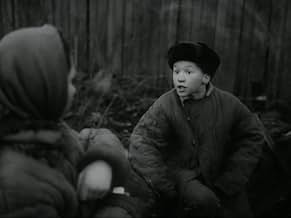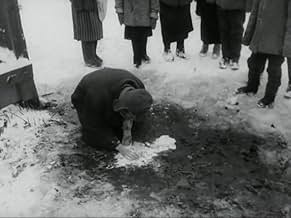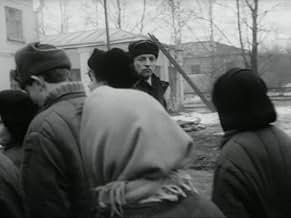AVALIAÇÃO DA IMDb
7,5/10
989
SUA AVALIAÇÃO
Adicionar um enredo no seu idiomaTwo children living in a remote mining town in the distant wastes of Siberia in 1947, survive poverty and hardship through the warmth of their friendship and a shared sense of humour.Two children living in a remote mining town in the distant wastes of Siberia in 1947, survive poverty and hardship through the warmth of their friendship and a shared sense of humour.Two children living in a remote mining town in the distant wastes of Siberia in 1947, survive poverty and hardship through the warmth of their friendship and a shared sense of humour.
- Prêmios
- 7 vitórias e 6 indicações no total
Avaliações em destaque
I don't know why I've seen so many reflexive, "only a movie" films lately, but here's another. It makes you wonder whether a viewer can choose to alter a film in his own mind, and take out the bits -- like this, for instance -- that partly ruin or deplete the experience for you. Aside from that, the film, which has rightly been assessed as being a kind of Russian "400 Blows," is awfully good, but since nothing really happens you may find yourself wishing it were shorter; but for me, it's enough to just enjoy the beautiful black and white cinematography, and the performance of this boy. It's a remarkable performance -- he's loud but not obnoxious, a little whiny but not snotty, cute but not sickly sweet. Even though the look and the feel of the film is unique -- or, a unique amalgam, I'll say -- even had it not been, it could rest quite well on the face of this boy, which is open, feminine, and almost Asian in its features, with sharp, tiny black eyes.
There are some pretty raucous scenes -- the most effective being a scene where villagers are clamoring for food handouts and one man eats a "pancake" of flour and mud, but also one at a cultural event (a ball of some sort?) where the visitors turn to drink. And like that other children's classic, "My Life as a Dog," it has one scene that will stay with you a while -- that one had the bottle scene, and this one has a scene where our hero gets peed on. (Unlike that film, not much attention is paid to sex; although there is one act of desperate adolescent sexual desire -- although it's more like a begging -- that's pretty good.)
The oblique narrative is sometimes hard to understand -- at least to me -- not tonally (it's neither light nor harsh, but it has a specific feel) but literally, and that's probably aided by the fact that the film is mostly a series of events rather than a kind of plot. That's fine, because many of the individual scenes are thoroughly interesting, and every once in a while we get one like the ice skate thieving, which is disorienting and lyrical at the same time. What's particularly interesting about the film, I think, is that it goes beyond mere mischievousness -- like James Dean, we are presented with a kid who wants to do the right thing, but everything he does gets screwed up. And it's surprising that we end up on his side, considering the fact that he at one point tips over a train. 9/10
There are some pretty raucous scenes -- the most effective being a scene where villagers are clamoring for food handouts and one man eats a "pancake" of flour and mud, but also one at a cultural event (a ball of some sort?) where the visitors turn to drink. And like that other children's classic, "My Life as a Dog," it has one scene that will stay with you a while -- that one had the bottle scene, and this one has a scene where our hero gets peed on. (Unlike that film, not much attention is paid to sex; although there is one act of desperate adolescent sexual desire -- although it's more like a begging -- that's pretty good.)
The oblique narrative is sometimes hard to understand -- at least to me -- not tonally (it's neither light nor harsh, but it has a specific feel) but literally, and that's probably aided by the fact that the film is mostly a series of events rather than a kind of plot. That's fine, because many of the individual scenes are thoroughly interesting, and every once in a while we get one like the ice skate thieving, which is disorienting and lyrical at the same time. What's particularly interesting about the film, I think, is that it goes beyond mere mischievousness -- like James Dean, we are presented with a kid who wants to do the right thing, but everything he does gets screwed up. And it's surprising that we end up on his side, considering the fact that he at one point tips over a train. 9/10
"Freeze Die Come to Life" - Vitaliy Kanevskiy's autobiographical drama. Post-war hungry years, a small city in the Far East. Around devastation, dirt, evil faces, former criminals, complete hopelessness. Only the friendship of 12-year-olds, a boy and a girl, living in the same hut, like a light ray in this dark scary surrounding world. Laureate of many film festivals, including Cannes. Fact: The author of the film, he was born in the Far East, and then served 8 years in prison.
10Céline
"Zamri, umri, vokresni!" is not, at first sight, a positive movie. And, as it develops, the tone gets darker. Vitali Kanevsky, the director, makes a very good use of black-and-white film. The lives of Galia and Valerka get increasingly unbearable. They make it bearable, however, by making easy bantering between them about which one's tea is better as they sell them to the people. Little things like that. In all the misery that he lives in, Valerka's main goal is still to catch a robber who stole his skates. They have not lost their childhood, not yet. Not until the end. It is interesting to note that "Zamri, umri, vokresni!" is also the name of a children's game in Russia. It means, literally, "Freeze, Die, Rise!"
Don't come to this expecting much in the way of a plot; it's a bunch of interconnected anecdotes about a boy living in a stark Siberian mining town. Apparently it's semi-autobiographical & filmed on a minuscule budget. Some online reviews claim the boy's mother is a prostitute (I thought her reference to that was metaphorical). The filmmaker certainly doesn't give much context away, but even without understanding much about Stalinist Siberia or knowing exactly what is meant by living in "the zone", for me the film conveys at once the frustration of living in exile with a child's failure to understand. Similarly, in his interaction with his caring older (girl) friend, the young protagonist conveys the often-heartless behavior of younger children. The actors are supposedly non-professionals; they do an excellent job. And the b&w photography is beautifully evocative. My only quibble is the "it's only a movie" ending.
10Andy-123
The director received funding for a 10-minute film and used those miniscule funds to make the most spirited film ever made (in my opinion), an extremely moving piece about two children in Siberia. The film is loose-as-a-goose -- there's never been a movie as "un-rigid" as this. In my mind it's a bookend to another film about children, the Spanish film "Spirit of the Beehive." But where that film's depth is in its poetry and mystery, this film's depth is in its emotions and sheer good-fellowship. They're opposites. Except that, to me, there's never been two better films. Why hasn't Kanevsky's second film, "An Independent Life," been released in the U.S.? Why has the second film of Victor Erice (the Spanish director), "The South," been virtually unseen in the U.S.? (It's as good as "Spirit of the Beehive.") I tell you... seeing those films will spoil you for nearly every other film!
Você sabia?
- ConexõesEdited into Histoire(s) du cinéma: Une vague nouvelle (1999)
- Trilhas sonorasYosakoi-bushi
(Kôchi prefecture folk song)
Principais escolhas
Faça login para avaliar e ver a lista de recomendações personalizadas
Detalhes
- Data de lançamento
- País de origem
- Idiomas
- Também conhecido como
- Freeze Die Come to Life
- Locações de filme
- Partizansk, Rússia(mining town formerly known as Suchan)
- Empresas de produção
- Consulte mais créditos da empresa na IMDbPro
- Tempo de duração
- 1 h 45 min(105 min)
- Cor
- Mixagem de som
Contribua para esta página
Sugerir uma alteração ou adicionar conteúdo ausente
























